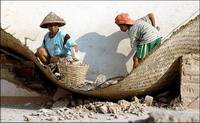Emergency phase is over in quake-damaged Peru
Doctors Without Borders and other foreign aid organizations will soon pull out of quake-damaged Peru, even though survivors are growing increasingly frustrated and angry over unmet government promises.

Basic needs are being met, aid groups said. But survivors of the Aug. 15 quake remain in makeshift shelters in the rubble of their homes and businesses, and many have given up on promised government help.
"The level of frustration, and I would even say aggression, is rising," said Franz Luef, emergency coordinator for Doctors Without Borders in Peru.
Pisco was hardest hit by the magnitude-8 earthquake, which killed at least 519 people, injured 1,366 and destroyed at least 40,000 homes in Peru, according to the civil defense agency. At least 340 died in this gritty port city 125 miles southeast of Lima, and 90 percent of its houses were destroyed.
The 45-member Doctors Without Borders team trained medical workers and provided mental health counseling, and is ready to hand over to the locals, but their response "is not as quick or as coordinated as we would like," Luef said.
Oxfam International, meanwhile, will switch from providing emergency water and sanitation to longer-term reconstruction projects in mid-November, said Oxfam aid worker Beto Calderon.
President Alan Garcia initially said Pisco's streets would be clean and ready for rebuilding by early September.
But almost two months after the quake, few roads in Pisco are navigable, and mototaxi drivers, their windshields white from the dust, swerve between hills of rubble. Many still live in small tents and huts, made from woven straw mats and plastic tarps that provide slim protection from winds that whip sand along the coast.
Some have resigned themselves to rebuilding without any help.
"We're buying tools to clean up our homes," said Rodolfo Guerrero, 50, carrying a new shovel to clear the rubble out of what was his Pisco restaurant. "We're not going to wait for the government."
But Garcia's government says it is doing the best it can under difficult conditions.
"We're working with what we can," said Garcia spokesman Jose Chirito. "We're not a country that has tons of equipment."
Garcia's government has promised grants of 6,000 soles (US$1,300; 920 EUR) to families whose homes were destroyed, but none have been issued yet, said Geraldo de la Vega, a spokesman for the government housing loan company.
Nationally, Garcia's approval rating jumped almost 10 points after the quake. The president rushed to Pisco and spent days on national television directing the initial disaster response.
People in Pisco are bewildered by such polls.
"He's not doing anything. He just came down here, worried that dust wouldn't fall on his shoes," said retired cotton farmer Vidal Melgar, whose walls were severely cracked.
Subscribe to Pravda.Ru Telegram channel, Facebook, RSS!


